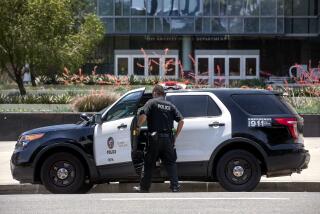OCCUPATION: Police Dispatcher
- Share via
Name: Bonnie Tyler
Employer: Seal Beach Police Department
Thumbs up: “I have to make quick decisions that affect people’s safety and property with information I get from questioning and listening, never seeing. I thrive on the challenge. I never have two days or even two hours alike. I handle many tasks at once and the fast pace doesn’t stress me in a negative way. I like having a job that allows me to be of service to others.”
Thumbs down: “We work in shifts and have days off that are different from family and friends.”
Advice: “There is a high turnover rate in this profession and usually there is no way to know how you’ll do until you try. But before entering the field, make sure you are comfortable with performing several tasks at once, are prompt, accurate, confident and level-headed.”
Salary range: $27,500-$34,500Fringe benefits: All full-time dispatchers receive paid vacation, medical, dental, vision and life insurance, paid sick leave and retirement plans.
Hours: Police radios and emergency calls must be monitored at all times, so dispatchers work shifts that include evenings and weekends. Educational and training requirements: A high school diploma or GED certificate. Smaller departments will hire inexperienced dispatchers and provide on-the-job training or instruction through the POST (Police Officer Standards and Training) Academy in Sacramento. Larger departments tend to hire experienced dispatchers only. Training includes stress management, basics of the Penal Code, instruction on how to operate radio equipment and how to respond calmly to emergency calls. Golden West College’s Criminal Justice Training Center teaches dispatcher training courses certified by POST.
Size of work force: Medium. Small departments like Seal Beach, San Clemente and Los Alamitos have four to eight dispatchers. Larger departments like Santa Ana, Huntington Beach and Anaheim employ at least 15 to 25.
Expected demand: Steady, but unlikely to increase significantly.
Job description: In smaller departments, dispatchers handle all incoming emergency and non-emergency calls while maintaining communication with officers in the field. They check computer data bases for information on suspects and vehicles and relay the information to requesting officers and detectives. In larger departments, a team of dispatchers monitors incoming 911 emergency calls only.
Advancement: Dispatchers may become support division supervisors, a position that oversees communications, records and animal control.
For more information: Local police departments; Golden West College’s Criminal Justice Training Center at (714) 895-8369.
Source: Local police departments and Golden West College
More to Read
Sign up for Essential California
The most important California stories and recommendations in your inbox every morning.
You may occasionally receive promotional content from the Los Angeles Times.













